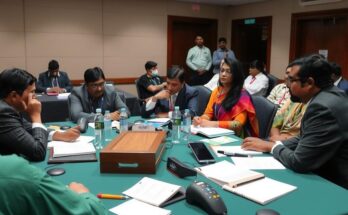The COP29 climate conference in Baku, Azerbaijan, focuses on addressing climate change through discussions among global leaders. Key issues include financial aid from developed to developing nations and differing priorities among attendees. The potential influence of future political leadership, especially concerning U.S. climate policy, remains a crucial point of contention. Public input is welcomed to foster comprehensive dialogue.
The COP29 climate conference is currently underway in Baku, Azerbaijan, bringing together scientists, experts, politicians, and global leaders to address the pressing issue of climate change. However, attendance varies among world leaders, and differing priorities complicate discussions. Key concerns include measures to mitigate climate change, transition away from fossil fuels, and the financial responsibilities of developed nations towards those historically affected by climate consequences. The complexity of yearly agenda topics, alongside the potential impact of future political leadership changes, such as Donald Trump’s anticipated presidency, raises critical questions about the effectiveness and sincerity of such dialogues. Participants and the public are invited to share their inquiries and concerns to facilitate a deeper understanding of these global challenges.
The Conference of the Parties, or COP, convenes annually to address various climate-related topics. This year’s meeting notably revolves around financial aid from developed nations to developing countries that are disproportionately affected by climate change, despite not being significant contributors to its causes. The historical context of this climate crisis necessitates urgent discussions about equitable responsibility and action. Additionally, the rise of political leaders who hold varying views on climate change signifies the complexity of reaching consensus on global policies. As developments unfold at COP29, public engagement is encouraged to bridge the gap between policy, science, and societal needs.
In summary, the ongoing COP29 conference highlights the various challenges and disparities in global climate action, primarily centered around financial commitments from developed countries and the impacts of leadership changes. The public’s voice is crucial in shaping the dialogue surrounding climate policy, urging all stakeholders to prioritize meaningful progress. Engaging with expert opinions and collective inquiries may facilitate a pathway to achieving tangible climate solutions.
Original Source: www.bbc.co.uk



